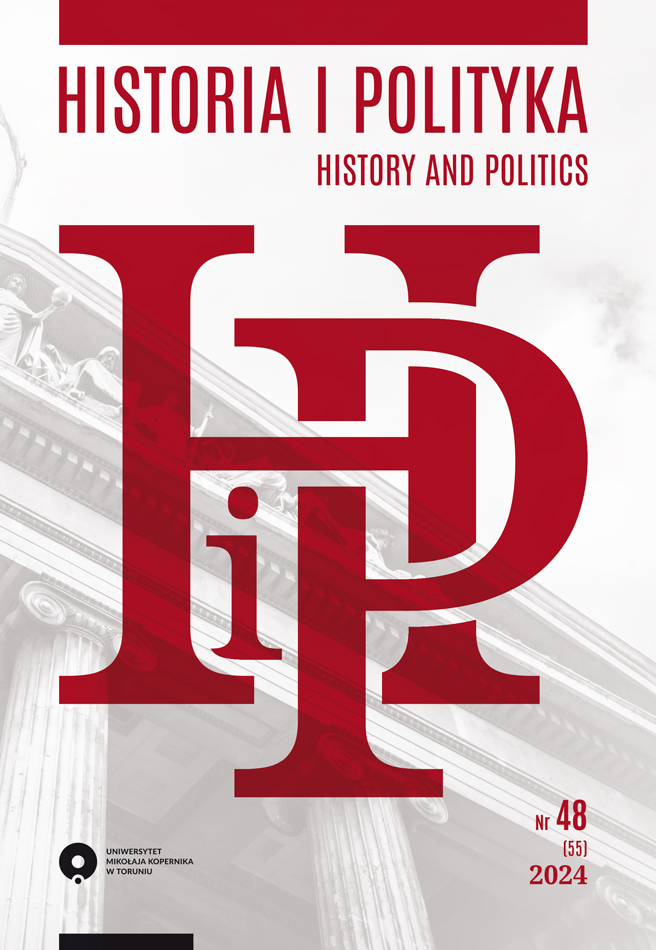Being a Guest in Your Own Home: Political Situation of South Tyrol and Its Inhabitants in the Years 1918–1945
DOI:
https://doi.org/10.12775/HiP.2024.012Słowa kluczowe
South Tyrol, italianization, Tyrol, Alto Adige, ethnic minorityAbstrakt
The end of the Great War led to the annexation of German-speaking South Tyrol to Italy. Italian efforts to culturally subordinate its German-speaking inhabitants clashed with their sense of strong regional patriotism. As a result, the population of South Tyrol was subjected to a strong and multidimensional Italianization, especially during the period of Italian fascism and the times immediately before it. Tyroleans had to bear a huge burden on the road to autonomy, still feeling like guests and not hosts in their local homeland. However, even in the reborn democratic state of Italy after World War II, the problems did not go away. The difficult history of interwar years turned out to be the first stage of the struggle for the right to self-determination of the regional community in South Tyrol.
Bibliografia
Alcock, A.E. (2001, May). The South Tyrol Autonomy: A Short Introduction. County Londonderry, Bozen/Bolzano: Office for Press and Public Relation. Retrieved from: https://web.archive.org/web/20110821012516/http://www.provinz.bz.it/en/downloads/South-Tyrol-Autonomy.pdf.
ASTAT. (2008). South Tyrol in Figures. Retrieved from: https://astat.provinz.bz.it/downloads/Siz_2008-eng.pdf.
Barker, E. (1973). Austria 1918–1972. London: Palgrave Macmillan.
Bonusiak, G. (2013). Położenie mniejszości niemieckojęzycznej w Południowym Tyrolu (Górnej Adydze) na tle stosunków austriacko-włoskich. In: R. Łoś, & J. Reginia-Zacharski (Eds.). Sąsiedztwo i pogranicze – między konfliktem a współpracą. Vol. 2 (pp. 121–131). Łódź: Wydawnictwo Uniwersytetu Łódzkiego. DOI: 0.18778/7525-825-7.08.
Burgwyn, J.H. (1997). Italian Foreign Policy in the Interwar Period, 1918–1940. Westport: Greenwood Publishing Group.
Di Michele, A. (2003). L’italianizzazione imperfetta. L’amministrazione pubblica dell’Alto Adige tra Italia liberale e fascismo. Alessandria: Edizioni dell’Orso.
Di Michele, A. (2014). Squadrismo e primo fascismo a Bolzano. In: H. Obermair, & S. Michielli (Eds.). Erinnerungskulturen des 20. Jahrhunderts im Vergleich: Culture della memoria del Novecento a confronto. Vol. 7 (pp. 47–54). Bolzano: Stadtarchiv Bozen/Archivio Storico della Città di Bolzano.
Domanegg, R. (2010). Die Teilung Tirols (1918–1922). historia.scribere, 2, 129–140.
Egger, T. (2018, April). Der Völkische Kampfring Südtirols (VKS) als Organisation und seine Aktionsweise im mittleren Pustertal während der Optionszeit. [Thesis.] Innsbruck: Leopold-Franzens-Universität.
Gierowski, J.A. (1985). Historia Włoch. Wrocław–Warszawa–Kraków–Gdańsk–Łódź: Zakład Narodowy im. Ossolińskich.
Golemo, K. (2019). Trydent-Górna Adyga. Problemy i wyzwania pogranicza włosko-germańskiego. In: K. Golemo, A. Małek, Włochy. Mozaika kultur (pp. 93–116). Kraków: Księgarnia Akademicka.
Grote, G. (2012). The South Tyrol Question, 1866–2010: From National Rage to Regional State. Bern: Peter Lang AG, International Academic Publishers.
Janke, P. (1992). Terrorism in South Tyrol. In: P. Janke (Ed.). Terrorism and Democracy: Some Contemporary Cases (pp. 1–33). London: Palgrave Macmillan.
Low, A.D. (1974). The Anschluss Movement, 1918–1919, and the Paris Peace Conference. Philadelphia: American Philosophical Society.
Manuale dell’Alto Adige con lo Statuto di Autonomia. (2019). Bolzano: Giunta provinciale di Bolzano.
Markusse, J. (2012). Relaxation of Tensions in the Multi-ethnic Border Province of South Tyrol: The Importance of Cross Border Relations. In: H. Knippenberg, & J. Markusse (Eds.). Nationalising and Denationalising European Border Regions, 1800–2000: Views from Geography and History (pp. 133–152). Dordrecht: Springer Science & Business Media.
Mayr, S. (2017). The Annihilation of the Jewish Community of Meran. In: G. Grote, & H. Obermair (Eds.). A Land on the Threshold: South Tyrolean Transformations, 1915–2015 (pp. 53–75). Oxford–Bern–New York: Peter Lang.
Motta, G. (2012). The Italian Military Governorship in South Tyrol and the Rise of Fascism. Roma: Edizioni Nuova Cultura.
Pallaver, G. (2014). Südtirol studieren, um den Faschismus zu verstehen. In: H. Obermair, & S. Michielli (Eds.). Erinnerungskulturen des 20. Jahrhunderts im Vergleich: Culture della memoria del Novecento a confronto. Vol. 7 (pp. 55–63). Bolzano: Stadtarchiv Bozen/Archivio Storico della Città di Bolzano.
Peterlini, O. (2000). Autonomia e tutela delle minoranze nel Trentino-Alto Adige. Cenni di storia e cultura, diritto e politica. Bolzano/Trento: Ufficio di Presidenza del Consiglio regionale del Trentino-Alto Adige.
Steininger, R. (2003). South Tyrol: A Minority Conflict of the Twentieth Century. New Brunswick: Transaction Publishers.
Steininger, R. (2011). Die Südtirolfrage. Retrieved from: https://www.uibk.ac.at/zeitgeschichte/zis/stirol.html.
Sternalski, P. (2013). Monokulturowość Włoch w okresie faszyzmu. Italianizacja mniejszości narodowych i ustawodawstwo rasowe. In: K. Golemo (Ed.). Włochy wielokulturowe. Regionalizmy – mniejszości – migracje (pp. 51–72). Kraków: Księgarnia Akademicka.
Von Hartungen, Ch.H. (2002). A Brief Contemporary History of Alto Adige/Südtirol (1918–2002). Bolzano: Consiglio. Retrieved from: https://assets-eu-01.kc-usercontent.com/61233281-10ab-0155-b35b-4a79363b5ead/355830df-fd44-4187-ad18-5311ef2186d8/108155_landesgeschichte_en.pdf.
Wolff, S. (2005). Complex Autonomy Arrangements in Western Europe: A Comparative Analysis of Regional Consociationalism in Brussels, Northern Ireland and South Tyrol. In: M. Weller, & S. Wolff (Eds.). Autonomy, Self-governance and Conflict Resolution: Innovative Approaches to Institutional Design in Divided Societies (pp. 101–136). London–New York: Routledge.
Pobrania
Opublikowane
Jak cytować
Numer
Dział
Licencja
Prawa autorskie (c) 2024 Paweł Kaszuba

Utwór dostępny jest na licencji Creative Commons Uznanie autorstwa – Bez utworów zależnych 4.0 Międzynarodowe.
Uniwersytet Mikołaja Kopernika w Toruniu respektuje prawo do prywatności i ochrony danych osobowych autorów.
Dane autorów nie są wykorzystywane w celach handlowych i marketingowych. Redaktorzy i recenzenci są zobowiązani do zachowania w poufności wszelkich informacji związanych ze złożonymi do redakcji tekstami.
Autor, zgłaszając swój tekst wyraża zgodę na wszystkie warunki i zapisy umowy licencyjnej (określającej prawa autorskie) z Uniwersytetem Mikołaja Kopernika w Toruniu.
Statystyki
Liczba wyświetleń i pobrań: 439
Liczba cytowań: 0



